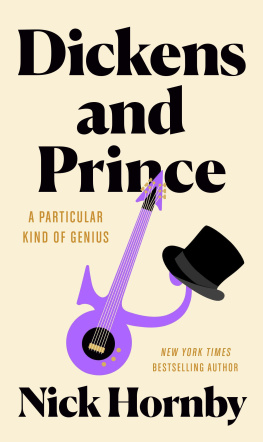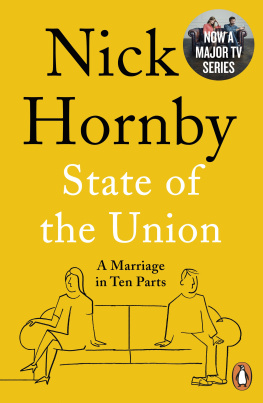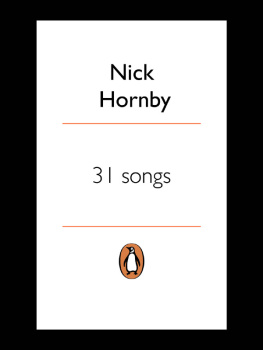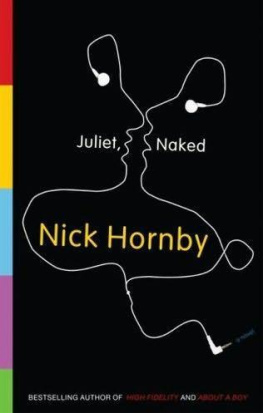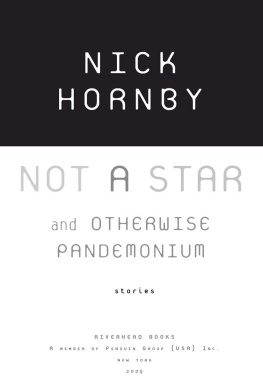Pray
Notes on a Football Season
Nick Hornby
R IVERHEAD B OOKS
a member of Penguin Group (USA) Inc.
New York
2012
Riverhead Books
Published by the Penguin GroupPenguin Group (USA) Inc., 375 Hudson Street, New York, New York 10014, USA
Penguin Group (Canada), 90 Eglinton Avenue East, Suite 700, Toronto, Ontario M4P 2Y3, Canada (a division of Pearson Penguin Canada Inc.)
Penguin Books Ltd, 80 Strand, London WC2R 0RL, England
Penguin Ireland, 25 St Stephens Green, Dublin 2, Ireland (a division of Penguin Books Ltd)
Penguin Group (Australia), 250 Camberwell Road, Camberwell, Victoria 3124, Australia (a division of Pearson Australia Group Pty Ltd)
Penguin Books India Pvt Ltd, 11 Community Centre, Panchsheel Park, New Delhi110 017, India
Penguin Group (NZ), 67 Apollo Drive, Rosedale, Auckland 0632, New Zealand (a division of Pearson New Zealand Ltd)
Penguin Books (South Africa) (Pty) Ltd, 24 Sturdee Avenue, Rosebank, Johannesburg 2196, South Africa
Copyright 2012 by Nick Hornby
First edition: Penguin Books, Ltd., United Kingdom 2012
First American edition: Riverhead Books 2012
All rights reserved. No part of this product may be reproduced, scanned, or distributed in any printed or electronic form without permission. Please do not participate in or encourage piracy of copyrighted materials in violation of the authors rights. Purchase only authorized editions.
Published simultaneously in Canada.
While the author has made every effort to provide accurate telephone numbers and Internet addresses at the time of publication, neither the publisher nor the author assumes any responsibility for errors, or for changes that occur after publication. Further, the publisher does not have any control over and does not assume any responsibility for author or third-party websites or their content.
Contents
ABOUT THE AUTHOR
Nick Hornby was born in 1957. Fever Pitch, his classic account of a life spent supporting Arsenal, which won the William Hill Sports Book of the Year Award, is celebrating the twentieth anniversary of its publication in 2012. It is soon to be republished as a Penguin Modern Classic, with a new introduction by the author. In recognition of Fever Pitch Hornby was honoured with the award of Outstanding Contribution to Sports Writing at the British Sports Book Awards in May 2012.
Nick Hornby is the author of six international bestselling novels, all available in Penguin: High Fidelity, About a Boy, How to be Good, A Long Way Down, Slam and Juliet, Naked. He has also written the screenplay for two films: Fever Pitch and An Education.
Nick Hornby lives and works in Highbury, north London.
Pray: Notes on the 2011/2012 Football Season
Sunday, 28 August 2011
Spurs 1 Manchester City 5
Manchester United 8 Arsenal 2
Uh-oh.
What else were you supposed to think on this third weekend of the new season, if you supported a Premiership team other than one of the Manchester clubs? Maybe you werent too worried if you followed Chelsea, the only team rich enough to compete with City and United. But if you were a fan of Arsenal, or Spurs, or Liverpool, and youd begun to half wonder whether your team stood half a chance, with a fair wind and a short injury-list, of becoming champions, then this was when you woke up. And if you were a fan of a club that you knew already was going to struggle for survival, then you probably started doing some multiplication sums in your head: so Arsenal finished fourth last year, and they let in eight. We finished sixteenth, which means And the most shocking piece of information these scores contained wasnt revealed until the very last day of the season, nearly nine months later: this wasnt just Manchester against North London. This was, as it turned out, the best two teams in England playing the third- and fourth-best teams in England. There was very little difference between third place and fourth in the final table; after what seemed like weeks of mediocrity, when neither team could get a win no matter who they played, Arsenal finished a point ahead of Spurs. And, of course, there was only goal difference between the two Manchester clubs. But the gap between Manchester and North London was nineteen points, or six wins and a draw.
It hasnt always been the biggest and richest clubs who finish champions. Seven different teams came top of the First Division in the twenty years before the Premiership began in 1992: Aston Villa (with Ipswich Town, who should have won it that year, in second place), Derby County, Nottingham Forest, Arsenal, Leeds United, Everton, and, eleven times, Liverpool who werent richer than any of the others, just better and smarter and more industrious. There were several other teams who were certainly able to compete financially with any club in that list, most notably Manchester United, who not only failed to win the old First Division in that time but actually managed to get themselves relegated.
More or less the moment the Premiership began in 1992, that all changed. TV money came pouring in, players were free to move from one country to the next, the gap between big and small clubs became accentuated. Manchester United won the first Premiership trophy, and kept on winning it, eight times in the next eleven years. Blackburn Rovers won it in 1995, four years after the multimillionaire industrialist Jack Walker took over. Walker spent 25 million in his first three years, and twice broke the British transfer record. Chelsea won in 2005, two years after a billionaire bought the club. And this year Manchester City became champions, four years after they were sold to the Abu Dhabi United Group. The lesson is clear: get yourself a sheikh, or an industrialist, or an oligarch, or, failing that, just be the worlds richest club, like United. Only my team, Arsenal, have won the Premier League three times without significant financial help from outside. But Arsenal is still a big, wealthy business, with a new stadium and crowds of 60,000. Theyre hardly Bash Street United. They can afford to pay players 100,000 a week or more. But they cant pay double that, which is what Manchester City have started to do over the last couple of years, and, increasingly, that was becoming a problem for Arsenal, and for everyone else.
So how much money would Arsenal and Spurs and all the teams underneath them need to close that nineteen-point gap? At the time of writing, Manchester City have bought thirty-six players since 2008, at a reported cost of 476 million. (Arsenals record transfer fee is 15 million, for Andrei Arshavin; City have spent more than that sixteen times in the last four years.) Ten of the thirty-six, the entire outfield, were in the team against Tottenham.
Its not just a matter of buying new players, though; Arsenal and Tottenham were having trouble preventing the ones they already had from following the money, and the success that the money brings with it. Arsenal had lost four players to City in the previous three years; Tottenham had spent most of their summer trying to keep hold of their star player, Luca Modric, who wanted to go to Chelsea. To Spurs credit, they refused to sell him, although he didnt look very happy that afternoon, and he didnt play well. He was substituted with twenty-five minutes to go. Whatever one thinks of Spurs, their emergence as a decent team under Harry Redknapp offered hope to all the sheikh-free; watching them get smashed to pieces by Manchester City seemed an ominous sign of things to come, not just this season, but every season thereafter. Increasingly fans of clubs not owned by a sheikhigarchy have come to realize that if a player is playing for their team, its because the super-rich dont want him. Yet.


